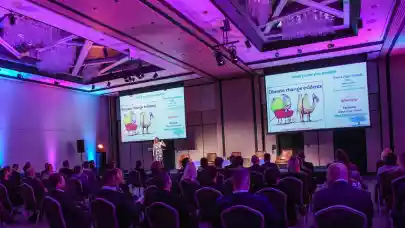
Climate change presents new challenges for the real estate sector but also an opportunity to get ahead of the competition. The topic was discussed at Balkans Property Forum 2021, Property Forum’s annual event in Belgrade.
Balkans Property Forum 2021 paid special attention to the impact of climate change on the real estate market. According to Diana Ürge-Vorsatz, one of the authors of the recently published UN report on climate change, people in the real estate sector should see the obligations that need to be fulfilled in order to eliminate carbon dioxide emissions by 2050 as a chance, because the timely implementation of these changes can put them in a better market position.
"Climate change imposes new risks on the real estate sector, however, the fight against it offers major new opportunities as well. In the next decades, the Balkans will see more frequent, hotter and longer heatwaves, stronger storms and more intense dry spells. Therefore, the real estate market will likely price heat resilient and water-efficient buildings as well as cool neighbourhoods much higher. Properties that are more resilient to storms, flash floods (where applicable) and power outages, for example, self-sufficient buildings, are also likely to increase in value. The fast accelerating movement towards net-zero carbon emissions also poses both threats and opportunities. First, natural gas as a source of heating or cooking will likely be significantly phased down in the next two decades, meaning that properties not relying on natural gas will have a cost/competitive advantage. Second, net-zero energy buildings will soon become very attractive for the increasingly climate-conscious buyers and tenants, and companies striving to reach net-zero emissions will soon strongly favour properties where their energy and operational emission impact is close to zero. Therefore, inefficient buildings with high air conditioning needs and thus carbon emissions are likely to lose value. As ESG and carbon neutrality rises on corporate and public agendas, companies competing on these claims will strongly favour zero energy and sustainably operating properties. This includes a move away from fully glazed office towers, focusing on concrete and steel as the primary materials of choice for construction and plastic-based furnishings while relying on more natural materials for construction and furnishings will have higher market values. Some of these trends will likely also be reinforced by relevant legislation, therefore properties/companies that step early and thus lead in these directions will have a competitive advantage", she explained.



